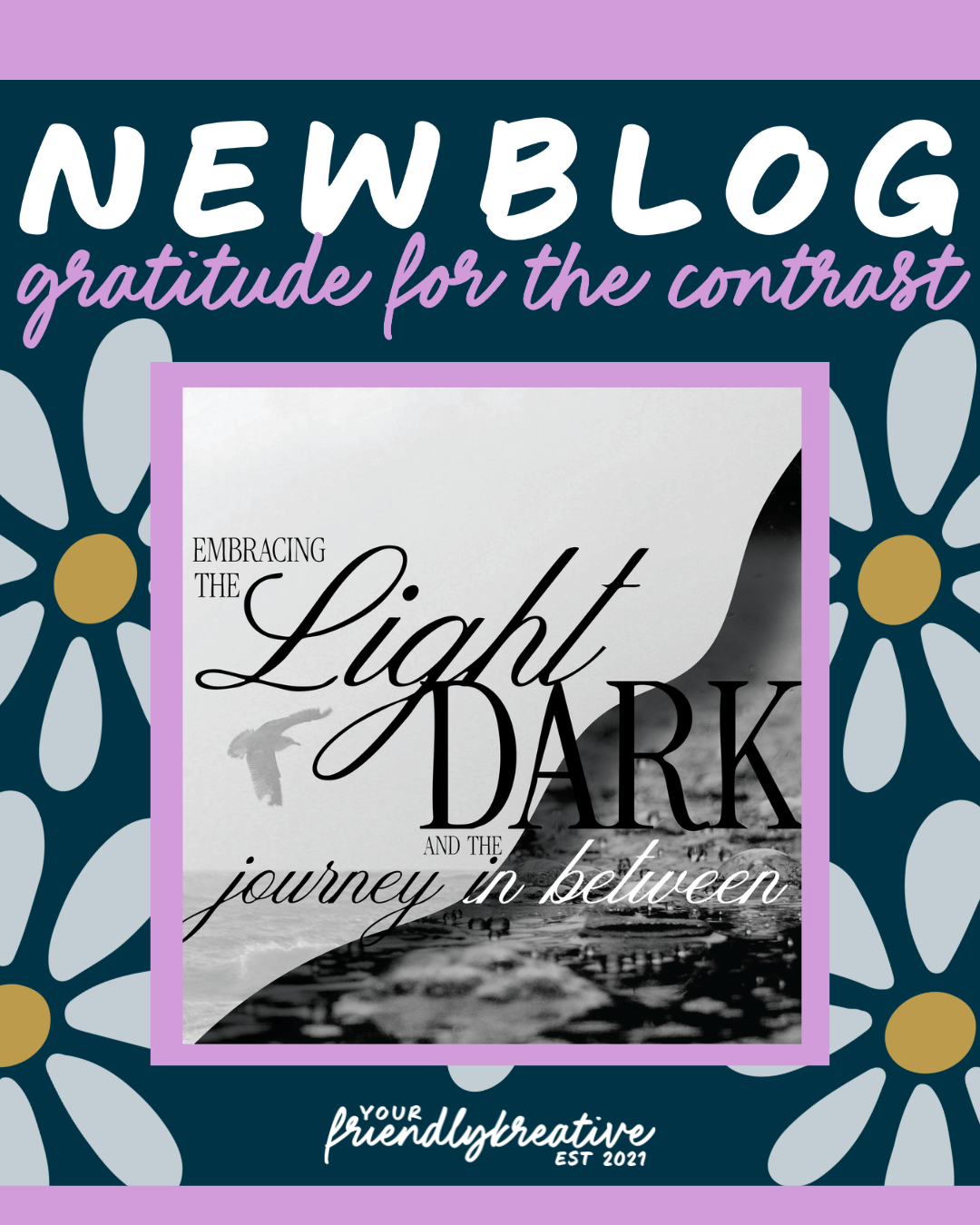Gratitude for the Contrast
Embracing Light, Dark, & the Journey In Between
Gratitude. It’s the word we hear endlessly this time of year, woven into commercials, splashed across social media, and nestled into self-help spaces. But how often do we feel gratitude deep in our core, rather than just going through the motions? Has the repetition dulled its meaning?
Contrast is something I often talk about—whether it’s with my clients, my dance students, or even myself. In tap, we find shading through soft and loud sounds. In contemporary, I ask my dancers to explore smooth and sharp textures. With clients, it’s negative space and balance, knowing when too much is too much. Even in design, contrast—like pairing thin, delicate ligatures with bold, solid typefaces—creates interest and depth.
But beyond art and movement, contrast exists in life itself. It’s what gives us a full spectrum of experience. And when it comes to gratitude, contrast has taught me this:
How can we truly know gratitude for the light if we haven’t also known the darkness?
Sitting in the Dark
Let’s pause for a moment—trigger warning here—to reflect on those dark times, the ones that shape us in ways we don’t always realize. For me, those moments include struggling with disordered eating and navigating thoughts I wasn’t sure how to process. In 2015/2016, I wasn’t self-aware enough to understand how deeply mental health could impact a person. Food and my body felt like enemies. My inner monologue mirrored every unkind word I’d ever been told.
It wasn’t necessarily that I wanted my life to end, but I also didn’t know how to keep going. I often wished for some twist of fate—an accident, a coma—so I wouldn’t have to make the choice myself. I felt only like a burden never like a blessing. Someone who didn’t belong, someone whose absence might be easier for everyone else.
Sitting with those feelings is uncomfortable. It’s heavy, painful, and at times, overwhelming. But it’s also where I discovered my strength—the kind of strength that lies in asking for help and facing truths you don’t want to confront. Slowly but surely, I learned to climb out of the dark. I began peeling away narratives that weren’t mine to begin with, reexamining expectations I’d absorbed from others, and learning to prioritize what truly mattered to me.
In that darkness, I discovered empathy. I realized how our unhealed pain can ripple outward, causing hurt we don’t always see. I found grace, resilience, and the courage to ask for help, even when I felt I didn’t deserve it. Most importantly, I realized something profound:
I wanted to be here.
But I wanted to be here differently. And that realization became my spark, my guide out of the shadows.
Coming to the Light
There’s something remarkable about light—it feels brighter, warmer, more, when it follows darkness. Like sipping sweet lemonade after a long, bitter day. Like the sun on your face after a harsh winter. Like hugging someone you love after too much time apart.
Of course, when you’re deep in the dark, the light can feel impossibly far away. That’s where self-care and therapy became lifelines for me. Through counseling, I began to hold space for myself—to rewrite old stories and rediscover what brought me joy. I started creating art, not to sell but just to make. I cooked and baked, not to feed others and receive compliments, but to lose myself in recipes. Even my choreography evolved as I stopped chasing perfection and embraced the journey.
Because life isn’t about destinations. We live and experience everything on the way. And that shift in perspective—learning to celebrate the small moments, to see victories in the every day—has been one of the most liberating lessons of my life.
Today, my inner monologue has transformed. It sounds more like my therapist’s voice than my own inner critic. It’s someone who loves me, sees my potential, and reminds me I’m worthy. That shift is hard to describe to someone who’s never hated themselves, but if you know, you know. It’s life-changing.
Reframing Darkness to Gratitude
I’m not here to romanticize trauma or dip into toxic positivity. But I do believe darkness shapes us in meaningful ways. I like to think of it as a flashlight—the very thing that helps us shine and direct our light.
Because I know what darkness feels like, I strive to avoid casting it onto others. I don’t want my words, emotions, or actions to create fear, hurt, or anger. Of course, I’m only human—my batteries will run low, my light will flicker, days even where it fades. But we all have to remember that darkness doesn’t erase our light. If anything, it gives it focus.
So, let me ask you:
What has a past struggle taught you about yourself?
How has it shaped the way you show up now?
And does the way you show up align with who you want to be?
Gratitude, Every Day
As we emerge from Thanksgiving, I hope we can carry the spirit of gratitude beyond this season. Let’s make it a daily practice, something deeper than a trendy buzzword. Imagine the ripple effect if we all found moments of gratitude for ourselves and each other each day.
Today, and every day, I am deeply grateful for the life I didn’t give up on and the person I continue to become.
I hope you find your own moments of gratitude, too—no matter where you are in your journey. <3


